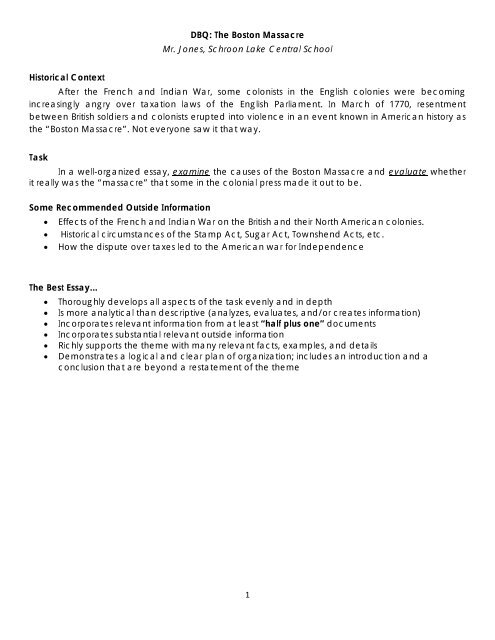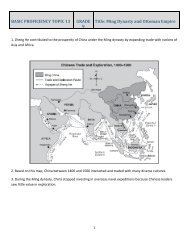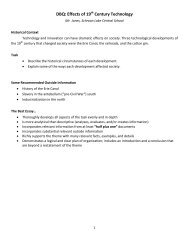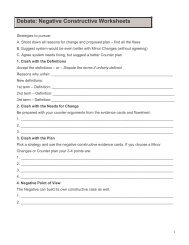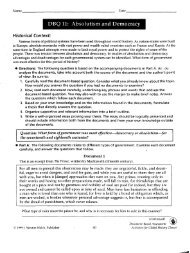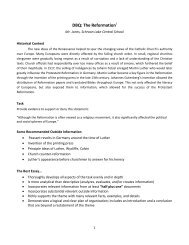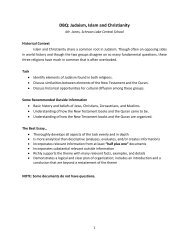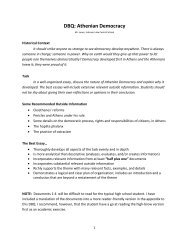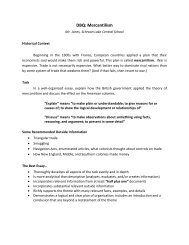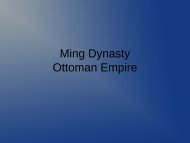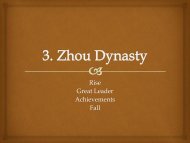1 DBQ: The Boston Massacre Mr. Jones, Schroon ... - JonesHistory.net
1 DBQ: The Boston Massacre Mr. Jones, Schroon ... - JonesHistory.net
1 DBQ: The Boston Massacre Mr. Jones, Schroon ... - JonesHistory.net
- No tags were found...
Create successful ePaper yourself
Turn your PDF publications into a flip-book with our unique Google optimized e-Paper software.
<strong>DBQ</strong>: <strong>The</strong> <strong>Boston</strong> <strong>Massacre</strong><br />
<strong>Mr</strong>. <strong>Jones</strong>, <strong>Schroon</strong> Lake Central School<br />
Historical Context<br />
After the French and Indian War, some colonists in the English colonies were becoming<br />
increasingly angry over taxation laws of the English Parliament. In March of 1770, resentment<br />
between British soldiers and colonists erupted into violence in an event known in American history as<br />
the “<strong>Boston</strong> <strong>Massacre</strong>”. Not everyone saw it that way.<br />
Task<br />
In a well-organized essay, examine the causes of the <strong>Boston</strong> <strong>Massacre</strong> and evaluate whether<br />
it really was the “massacre” that some in the colonial press made it out to be.<br />
Some Recommended Outside Information<br />
• Effects of the French and Indian War on the British and their North American colonies.<br />
• Historical circumstances of the Stamp Act, Sugar Act, Townshend Acts, etc.<br />
• How the dispute over taxes led to the American war for Independence<br />
<strong>The</strong> Best Essay…<br />
• Thoroughly develops all aspects of the task evenly and in depth<br />
• Is more analytical than descriptive (analyzes, evaluates, and/or creates information)<br />
• Incorporates relevant information from at least “half plus one” documents<br />
• Incorporates substantial relevant outside information<br />
• Richly supports the theme with many relevant facts, examples, and details<br />
• Demonstrates a logical and clear plan of organization; includes an introduction and a<br />
conclusion that are beyond a restatement of the theme<br />
1
Document 1 [<strong>The</strong> paragraphing is not original.]<br />
“... In my way there I saw the people in great commotion, and heard them use the most cruel and<br />
horrid threats against the troops. In a few minutes after I reached the guard, about 100 people<br />
passed it and went towards the custom house where the king's money is lodged. <strong>The</strong>y immediately<br />
surrounded the sentry posted there, and with clubs and other weapons threatened to execute their<br />
vengeance on him. I was soon informed by a townsman their intention was to carry off the soldier<br />
from his post and probably murder him... I immediately sent a noncommissioned officer and 12 men<br />
to protect both the sentry and the king's money, and very soon followed myself to prevent, if<br />
possible, all disorder, fearing lest the officer and soldiers, by the insults and provocations of the<br />
rioters, should be thrown off their guard and commit some rash act. <strong>The</strong>y soon rushed through the<br />
people, and by charging their bayo<strong>net</strong>s in half-circles, kept them at a little distance. ..<strong>The</strong> mob still<br />
increased and were more outrageous, striking their clubs or bludgeons one against another, and<br />
calling out, come on you rascals, you bloody backs, you lobster scoundrels, fire if you dare, […], and<br />
much more such language was used.<br />
At this time I was between the soldiers and the mob, parleying with, and endeavouring all in my<br />
power to persuade them to retire peaceably, but to no purpose. <strong>The</strong>y advanced to the points of<br />
the bayo<strong>net</strong>s, struck some of them and even the muzzles of the pieces, and seemed to be<br />
endeavouring to close with the soldiers. On which some well behaved persons asked me if the guns<br />
were charged. I replied yes. <strong>The</strong>y then asked me if I intended to order the men to fire. I answered<br />
no, by no means, observing to them that I was advanced before the muzzles of the men's pieces,<br />
and must fall a sacrifice if they fired ...While I was thus speaking, one of the soldiers having received<br />
a severe blow with a stick, stepped a little on one side and instantly fired, on which turning to and<br />
asking him why he fired without orders, I was struck with a club on my arm, which for some time<br />
deprived me of the use of it, which blow had it been placed on my head, most probably would<br />
have destroyed me.<br />
On this a general attack was made on the men by a great number of heavy clubs and snowballs<br />
being thrown at them, by which all our lives were in imminent danger, some persons at the same<br />
time from behind calling out, […] why don't you fire. Instantly three or four of the soldiers fired, one<br />
after another, and directly after three more in the same confusion and hurry. <strong>The</strong> mob then ran<br />
away, except three unhappy men who instantly expired […] <strong>The</strong> whole of this melancholy affair was<br />
transacted in almost 20 minutes. On my asking the soldiers why they fired without orders, they said<br />
they heard the word fire and supposed it came from me. This might be the case as many of the<br />
mob called out fire, fire, but I assured the men that I gave no such order; that my words were, don't<br />
fire, stop your firing. In short, it was scarcely possible for the soldiers to know who said fire, or don't<br />
fire, or stop your firing.”<br />
- Excerpt from the report of Captain Thomas Preston<br />
"Eyewitnesses to the <strong>Boston</strong> <strong>Massacre</strong> - HistoryWiz Primary Sources." HistoryWiz: for Students, Teachers and Lovers of History.<br />
Web. 10 Dec. 2010. .<br />
1. This version of the account is evidence for (check one): [ ] colonists [ ] Crown<br />
2. I find this testimony (check one) [ ] highly reliable [ ] sort of reliable [ ] unreliable<br />
2
Document 2<br />
THE HORRID MASSACRE IN BOSTON, PERPETRATED IN THE EVENING OF THE FIFTH DAY OF MARCH, 1770,<br />
BY SOLDIERS OF THE TWENTY-NINTH REGIMENT WHICH WITH THE FOURTEENTH REGIMENT WERE THEN<br />
QUARTERED THERE; WITH SOME OBSERVATIONS ON THE STATE OF THINGS PRIOR TO THAT<br />
CATASTROPHE.<br />
“[…] Samuel Drowne declares that, about nine o'clock of the evening of the fifth of March current,<br />
standing at his own door in Cornhill, he saw about fourteen or fifteen soldiers of the 29th regiment,<br />
who came from Murray's barracks, armed with naked cutlasses, swords, &c., and came upon the<br />
inhabitants of the town, then standing or walking, and abused some, and violently assaulted others<br />
as they met them; most of whom were without so much as a stick in their hand to defend themselves,<br />
as he very clearly could discern, it being moonlight, and himself being one of the assaulted persons.<br />
[…]<br />
“<strong>The</strong> violent proceedings of this party, and their going into King street, "quarrelling and fighting with<br />
the people whom they saw there" (mentioned in <strong>Mr</strong>. Drowne's deposition), was immediately<br />
introductory to the grand catastrophe.<br />
[…] “<strong>The</strong> outrageous behavior and the threats of the said party occasioned the ringing of the<br />
meeting-house bell near the head of King street, which bell ringing quick, as for fire, it presently<br />
brought out a number of inhabitants, who being soon sensible of the occasion of it, were naturally<br />
led to King street, where the said party had made a stop but a little while before, and where their<br />
stopping had drawn together a number of boys, round the sentry at the Custom House. Whether the<br />
boys mistook the sentry for one of the said party, and thence took occasion to differ with him, or<br />
whether he first affronted them, which is affirmed in several depositions,-however that may be, there<br />
was much foul language between them, and some of them, in consequence of his pushing at them<br />
with his bayo<strong>net</strong>, threw snowballs at him, which occasioned him to knock hastily at the door of the<br />
Custom House. From hence two persons thereupon proceeded immediately to the main-guard,<br />
which was posted opposite to the State House, at a small distance, near the head of the said street.<br />
<strong>The</strong> officer on guard was Capt. Preston, who with seven or eight soldiers, with fire-arms and charged<br />
bayo<strong>net</strong>s, issued from the guardhouse, and in great haste posted himself and his soldiers in front of<br />
the Custom House, near the corner aforesaid. […].<br />
“<strong>The</strong> said party was formed into a half circle; and within a short time after they had been posted at<br />
the Custom House, began to fire upon the people.<br />
“Captain Preston is said to have ordered them to fire, and to have repeated that order. One gun<br />
was fired first; then others in succession and with deliberation till ten or a dozen guns were fired; or till<br />
that numbers of discharges were made from the guns that were fired. By which means eleven<br />
persons were killed and wounded, as above represented.”<br />
- Anonymous Account of the <strong>Boston</strong> <strong>Massacre</strong><br />
"Eyewitnesses to the <strong>Boston</strong> <strong>Massacre</strong> - HistoryWiz Primary Sources." HistoryWiz: for Students, Teachers and Lovers of History.<br />
Web. 10 Dec. 2010. .<br />
1. This version of the account is evidence for (check one): [ ] colonists [ ] Crown<br />
2. I find this testimony (check one) [ ] highly reliable [ ] sort of reliable [ ] unreliable<br />
3
Document 3<br />
1. This version of the account is evidence for (check one): [ ] colonists [ ] Crown<br />
2. I find this testimony (check one) [ ] highly reliable [ ] sort of reliable [ ] unreliable<br />
4
Document 4<br />
Extract of a Letter from London, Dec. 1769.<br />
"Bernard was at Court last week, and very little attended to; and I am told, attends the doors of the<br />
Great frequently, without admission."<br />
“Sir,<br />
Governor of Massachusetts Bay, begins to cry peccavi; and he now makes no scruple publicly to<br />
declare, that the acts of violence which have been attempted to be perpetrated at <strong>Boston</strong>, under<br />
his administration there, were entirely against the bent of his natural disposition, as much as they<br />
were contrary to the fundamental laws of the colony over which he presided; and that if he<br />
deserves blame, other people ought to be brought to account for his conduct. In short, it is too<br />
evident, that arbitrary rule is the determined principle of the present alarming era in this kingdom,<br />
and nothing but a steady perseverance in the people to vindicate their just rights, can prevent<br />
them from falling under the most abject slavery. (London Gazetteer, Nov. 21.)”<br />
"<strong>Boston</strong> <strong>Massacre</strong>." Virtualology A Virtual Education Project. Web. 10 Dec. 2010.<br />
.<br />
1. This version of the account is evidence for (check one): [ ] colonists [ ] Crown<br />
2. I find this testimony (check one) [ ] highly reliable [ ] sort of reliable [ ] unreliable<br />
5
Document 5<br />
“<strong>Boston</strong>'s Bloody Affray<br />
[…] <strong>The</strong> committee may have admitted that there was no evidence that the affair was the result of a<br />
premeditated "plot to massacre the inhabitants," but it did not hesitate to characterize it as a<br />
"massacre." Newspaper and broadside accounts, dated from the day of the committee report,<br />
called it "this horrid <strong>Massacre</strong>." Paul Revere's well-known and somewhat inaccurate colored<br />
engraving of the affair, which was labeled, "<strong>The</strong> Bloody <strong>Massacre</strong>," was issued on the same day.<br />
<strong>The</strong> town meeting's committee, of which Samuel Adams was a member, then wrote a longer<br />
account, called "A Short Narrative of the Horrid <strong>Massacre</strong>," and submitted it a week later under the<br />
signatures of the formal heads of the committee, Bowdoin, Pemberton, and Warren. <strong>The</strong> meeting<br />
accepted it and had it printed, and copies of it were immediately sent to England in order to give an<br />
account of the events that would help shape the reporting of the event there. Calling it a "massacre,"<br />
rather than a "riot," a "tragedy," or a "disturbance," as the soldiers and colonial officials were inclined<br />
to do, went far toward absolving the residents of <strong>Boston</strong> of blame for the incident and indicting public<br />
opinion against the soldiers. In addition, calling it a "massacre," rather than a "murder," suggested that<br />
it might have been organized, and not a spontaneously unfolding event.”<br />
- "<strong>Boston</strong>'s Bloody Affray | Teachinghistory.org." Teachinghistory.org. Web. 10 Dec. 2010. .<br />
1. This version of the account is evidence for (check one): [ ] colonists [ ] Crown<br />
2. I find this testimony (check one) [ ] highly reliable [ ] sort of reliable [ ] unreliable<br />
6
Document 6 [Paragraphing is not original]<br />
Deposition of William Wyat, March 7, 1770<br />
William Wyat provided the account below of the <strong>Boston</strong> <strong>Massacre</strong> just two days after the event. It<br />
was one of 96 such accounts collected by the town of <strong>Boston</strong> and printed for distribution in England<br />
as part of a pamphlet entitled "A Short Narrative of the Horrid <strong>Massacre</strong> in <strong>Boston</strong> Perpetrated...by<br />
Soldiers of the 29th Regiment.<br />
“I, William Wyat, of Salem, coaster, testify and say, that last Monday evening, being the fifth day of<br />
March current, I was in <strong>Boston</strong>, down at Treat's wharf, where my vessel was lying, and hearing the<br />
bells ring, supposed there was a fire in the town, whereupon I hastened up to the Town house, on<br />
the south side of it, where I saw an officer of the army lead out of the guard house there seven or<br />
eight soldiers of the army, and lead them down in seeming haste, to the Custom house on the<br />
north side of King street, where I followed them, and when the officer had got there with the men,<br />
he bid them face about. I stood just below them on the left wing, and the said officer ordered his<br />
men to load, which they did accordingly, with the utmost dispatch, then they remained about six<br />
minutes, with their firelocks rested and bayo<strong>net</strong>s fixed, but not standing in exact order I observed a<br />
considerable number of young lads, and here and there a man amongst them, about the middle<br />
of the street, facing the soldiers, but not within ten or twelve feet distance from them ; I observed<br />
some of them, viz., the lads, &c., had sticks in their hands, laughing, shouting, huzzaing, and crying<br />
fire; but could not observe that any of them threw anything at the soldiers, or threatened any of<br />
them.<br />
<strong>The</strong>n the said officer retired from before the soldiers and stepping behind them, towards the right<br />
wing, bid the soldiers fire; they not firing, he presently again bid 'em fire, they not yet firing, he<br />
stamped and said, " D[--] your bloods, fire, be the consequence what it will ;" then the second man<br />
on the left wing fired off his gun, then, after a very short pause, they fired one after another as quick<br />
as possible, beginning on the right wing; the last man's gun on the left wing flashed in the pan, then<br />
he primed again, and the people being withdrawn from before the soldiers, most of them further<br />
down the street, he turned his gun toward them and fired upon them. Immediately after the<br />
principal firing, I saw three of the people fall down in the street; presently after the last gun was fired<br />
off, the said officer, who had commanded the soldiers (as above) to fire, sprung before them,<br />
waving his sword or stick[…] And I remember as the said officer was going down with the soldiers<br />
towards the Custom house, a gentleman spoke to him and said, " Capt. Preston, for God's sake<br />
keep your men in order, and mind what you are about." And further I say not.”<br />
March 7, 1770. WILLIAM WYAT.<br />
Source:<br />
Originally published in "A Short Narrative of the Horrid <strong>Massacre</strong> in <strong>Boston</strong> Perpetrated in the Evening of the Fifth Day of<br />
March, 1770, by the Soldiers of the 29th Regiment, which with the 14th Regiment Were <strong>The</strong>n Quartered <strong>The</strong>re..." (<strong>Boston</strong>,<br />
1770); republished, with additional material, by John Doggett, Jr. (New York, 1849).<br />
1. This version of the account is evidence for (check one): [ ] colonists [ ] Crown<br />
2. I find this testimony (check one) [ ] highly reliable [ ] sort of reliable [ ] unreliable<br />
7
Document 7<br />
Testimony of Matthew Murray, October 26, 1770<br />
Seven months after the protest and shootings known as the <strong>Boston</strong> <strong>Massacre</strong>, Captain Thomas<br />
Preston, who commanded the soldiers in King Street that evening, went on trial for murder. Matthew<br />
Murray served as a defense witness in the trial and was called by Preston's lawyers to give evidence<br />
they believed would help acquit their client. <strong>The</strong>re were no formal court reporters at that time, and all<br />
that remains of Murray's testimony is an anonymous summary found among the papers of John<br />
Adams, one of Preston's lawyers.<br />
“Heard the Bells and ran out and heard what was in King street. I went in and got the handle of a<br />
Broom. Went to King Street. Saw no Soldiers. Went to Murrays Barracks. <strong>The</strong> Soldiers were gone. <strong>The</strong>y<br />
bid me go home. Went into King Street, heard the Barbers boy say this is the man struck me with the<br />
breech of his Gun. <strong>The</strong> Centinel went to the steps and loaded. <strong>The</strong>y dared him to fire. <strong>The</strong> Guard<br />
came down. I saw 'em load. Somebody spoke to the Captain and told him he had best withdraw<br />
none of the People would interrupt him. I stood next to the Grenadier. Saw a stick or piece of Ice<br />
strike him upon his right side. On which he instantly fired and I went off. I heard no order given. I stood<br />
within two yards of the Captain. He was in the front talking with a Person, I dont know who. I was<br />
looking at the Captain when the Gun was fired. <strong>The</strong> Soldier stood on the Captains right. I saw two or<br />
three Snow balls thrown at the Soldiers before the Gun was fired, but none after for I went off<br />
immediately. <strong>The</strong> Captain had a Sword in his hand. I know not whether he had a Surtout on but<br />
believe he had. I know Capt. Preston by sight. <strong>The</strong> Prisoner is the Man. A Woman crowded by and<br />
spoke to the second Soldier on the right. I think if the Captain had given orders anything loud I should<br />
have heard.”<br />
Source:<br />
<strong>The</strong> original document is in the Public Record Office, London. <strong>The</strong> above version was taken from a scan of the original<br />
published in L. Kinvin Wroth and Hiller B. Zobel, eds., <strong>The</strong> Legal Papers of John Adams, 3 vols. (Cambridge: Harvard University<br />
Press, 1965), 3: 69-70.<br />
1. This version of the account is evidence for (check one): [ ] colonists [ ] Crown<br />
2. I find this testimony (check one) [ ] highly reliable [ ] sort of reliable [ ] unreliable<br />
8
<strong>The</strong> Plain English Version<br />
Documents 1, 2, and 4 are particularly difficult for young readers. <strong>The</strong>y have been translated here<br />
into more modern and somewhat simpler form.<br />
Document 1<br />
On my way there, I saw some people all excited and heard them threatening the troops. A<br />
few minutes after I reached the guard, about 100 people passed by and went towards the custom<br />
house where the king’s money is kept. <strong>The</strong>y immediately surrounded the soldier posted there and<br />
threatened him with clubs and sticks. Someone standing by told me they were planning to kidnap<br />
and murder him. I immediately sent an officer and 12 men to protect the soldier and the king’s<br />
money. I also rushed over in case in all the excitement the soldiers did something they would later<br />
regret.<br />
<strong>The</strong> soldiers soon kept the people back using bayo<strong>net</strong>s, but more and more people came. <strong>The</strong><br />
slammed their clubs and sticks together and chanted insults at the troops. <strong>The</strong>y dared them to fire.<br />
<strong>The</strong>y used foul language and swearing. I tried my best to talk everyone down peacefully. It didn’t<br />
work.<br />
A bystander who was not no badly behaved asked me if the guns were loaded. I said yes. He<br />
asked me if I planned to order the men to fire. I said absolutely not! Just as I said than, a soldier got hit<br />
with a club and as he stumbled back, he fired without orders. I got hit in the arm so hard – if it were<br />
my head, I would have been killed!<br />
Our lives were now in danger as the crazy mob advanced on us. <strong>The</strong>y kept daring us to fire.<br />
Suddenly, three or four soldiers fired. <strong>The</strong> mob ran away scared, except for the three guys who were<br />
killed. When I asked them if they fired without orders, they said they heard the order to fire and<br />
thought it came from me.<br />
Document 2<br />
Samuel Drowne says that around 9 pm on 5 th March he was standing in his doorway in Cornhill<br />
and he saw around 14 or 15 soldiers coming from Murray’s barracks. <strong>The</strong>y were armed with daggers<br />
and swords and such. <strong>The</strong>y came upon some of the citizens who were standing or walking. <strong>The</strong>y beat<br />
up a few as they met them – all unarmed citizens. Samuel Drowne says he was beaten up as well!<br />
This violent gang of soldiers walked up King street beating people up.<br />
<strong>The</strong> outrageous behavior of the soldiers caused someone to ring the meeting house bell as if<br />
there were a fire. It brought out lots of people. A number of tough boys went over to surround and<br />
threaten the guard at the Custom house. Maybe they thought he was one of the rough soldiers in the<br />
gang beating people up? <strong>The</strong>re was a lot of swearing and the boys started pelting the guard with<br />
snowballs. He threatened them with his bayo<strong>net</strong> and knocked hard at the door of the custom house<br />
to be let back in. A small group of seven or eight soldiers soon came to his recue, led by Captain<br />
Preston, and they had guns and bayo<strong>net</strong>s. <strong>The</strong>y placed themselves in front of the Custom house to<br />
protect the guard and the custom house. <strong>The</strong>y formed a half circle and then in a short time began to<br />
fire on the people.<br />
9
<strong>The</strong>y say Captain Preston ordered them to fire and to have repeated the order. One gun was<br />
fired first, then others one after another all on purpose until ten or twelve were fired. Eleven persons<br />
were killed or wounded.<br />
Document 4<br />
Piece of a letter to the Editor of a London newspaper in Dec. 1769 (a year before the <strong>Boston</strong><br />
<strong>Massacre</strong>)<br />
To the Editor:<br />
<strong>The</strong> governor of Massachusetts Bay begins to say he’s guilty and sorry for the acts of violence<br />
the soldiers under his command have committed in <strong>Boston</strong> under his command. He says it goes<br />
against his nature to be so cruel just as much as it goes against the colonial laws. He says other<br />
people are to blame for his actions. It seems sadly true that governors do whatever they want in this<br />
kingdom without regard to the law. People need to stand up for their rights or else become slaves!<br />
10


